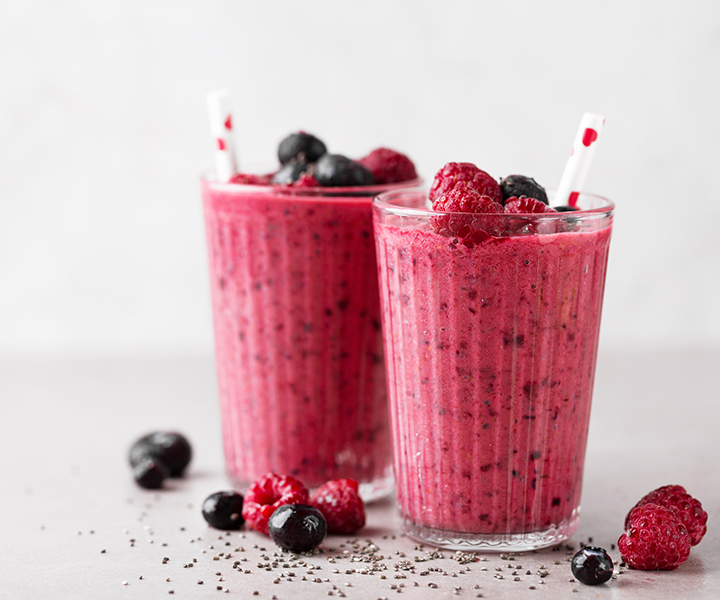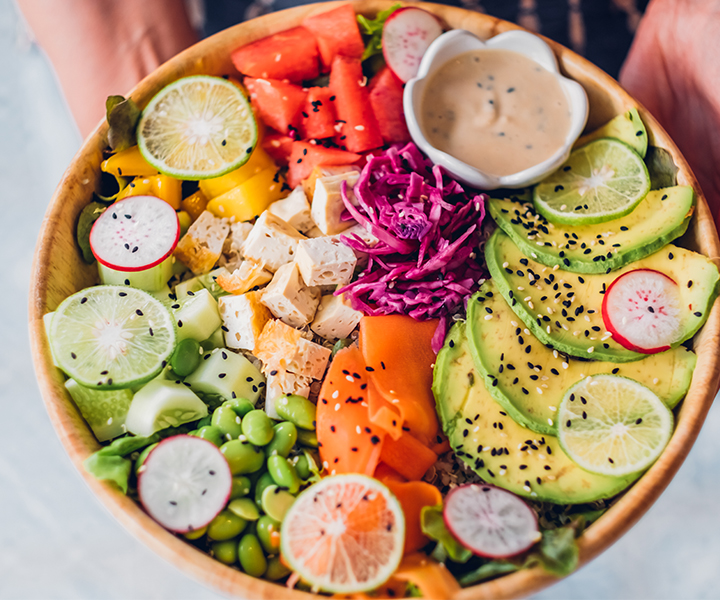An anti-inflammatory diet is a pillar of health prevention
19 November 2025 | Comment(s) |
Christelle Travelletti

Chronic inflammation is now recognised as a major risk factor in the development of many modern diseases. In addition, many people with diabetes, obesity or rheumatism also suffer from chronic inflammation. Fortunately, our diet can play a key role in reducing or preventing it.
How can we do this in practice, and which foods should we prioritise as part of an anti-inflammatory diet? Here we explain everything and share four recipes for a typical day without inflammation.
Why is it necessary to fight chronic inflammation?
Inflammation is a natural response by our immune system to aggression such as infection, injury or toxins. It is useful in the short term, but when it becomes chronic, it can harm our health. Numerous studies have shown that persistent inflammation is involved in the development of diseases such as:
- Cardiovascular disease
- Type 2 diabetes
- Arthritis and joint pain
- Certain cancers, particularly breast cancer
- Asthma and allergies
- Neurodegenerative diseases (Alzheimer's, Parkinson's)
The main principles of an anti-inflammatory diet
Inspired by the Mediterranean and Okinawan diets, the anti-inflammatory diet is based on a balanced diet that favours plant-based foods and omega-3 fatty acids.
While the Mediterranean diet emphasises fruit and vegetables, fish and olive oil, the second diet, which originated in Japan, is characterised by the absence of dairy products and red meat.
To avoid deficiencies, particularly in protein, iron or calcium, we still suggest that you continue to eat red meat and do not stop consuming dairy products unless you are lactose intolerant.

Prioritise:
- Fresh fruit and vegetables: rich in antioxidants, fibre and vitamins (berries, citrus fruits, spinach, broccoli, beetroot, etc.)
- Oily fish: sardines, mackerel, salmon, rich in omega-3
- Seeds and nuts: chia seeds, flax seeds, walnuts, almonds
- Whole grains: quinoa, brown rice, oats, buckwheat
- Legumes: lentils, chickpeas, red beans
- Plain yoghurt, Skyr: rich in probiotics that promote healthy gut microbiota and regulate inflammation.
- Spices and herbs: turmeric, ginger, garlic, rosemary, parsley
- High-quality vegetable oils: extra virgin olive oil, rapeseed oil
- Green teas, herbal teas, water: for antioxidant hydration
To be eaten in moderation:
- Red meat: eat in moderation, favouring organic, local, high-quality meat from grass-fed animals. Once or twice a week is a reasonable frequency.
- Industrial poultry: choose organic chicken or turkey, raised without antibiotics, for better nutritional quality.
- Industrial wheat: there is no need to give up gluten unless you are intolerant to it, but occasionally replace traditional pasta with other grains such as quinoa, buckwheat, brown rice, millet or amaranth.
To be avoided or even eliminated from your diet:

- Ultra-processed products: industrial cold meats, fried foods, savoury snacks, ready meals
- Refined sugars: pastries, soft drinks, sweets, biscuits
- Oils rich in omega-6: sunflower, corn, peanut
- Alcohol: highly inflammatory
The benefits of anti-inflammatory foods in everyday life
Beyond disease prevention, an anti-inflammatory diet:
- Promotes better digestion and balanced gut microbiota
- Improves sleep quality
- Reduces chronic fatigue
- Contributes to better weight management
- Supports mental health and reduces oxidative stress
Examples of anti-inflammatory menus

Menu 1 – Breakfast
- Anti-inflammatory smoothie: 1 cup of red berries (blueberries, raspberries), 1 tablespoon of ground flaxseed, 1 glass of almond milk, 1 pinch of turmeric + black pepper
- 1 slice of wholemeal bread with almond butter

Menu 2 – Dinner
Buddha bowl:
- Cooked quinoa or rice
- Roasted chickpeas with paprika
- Roasted vegetables (carrots, courgettes, peppers)
- Sliced avocado
- Plant-based yoghurt, lemon and turmeric sauce
- Organic chicken grilled with olive oil or sardines
Menu 3 – Afternoon snack
- Plain yoghurt or skyr with chia seeds, nuts and cinnamon
- Fresh fruit + a square of dark chocolate

Menu 4 – Supper
- Baked cod with turmeric and lemon
- 1 cod fillet
- 1 tablespoon olive oil
- 1/2 teaspoon turmeric
- Juice of 1/2 lemon
- Salt, pepper, fresh herbs (parsley or coriander)
Preparation:
Preheat the oven to 180°C. Place the cod fillet in a baking dish, drizzle with olive oil and lemon juice, sprinkle with turmeric, season with salt and pepper, and add the herbs. Bake for 15 to 20 minutes, depending on the thickness of the fish.
- Side dishes:
- Steamed broccoli
- Oven-roasted sweet potato with a drizzle of olive oil and rosemary
- Drink:
- Fresh ginger and lemon infusion
The importance of physical activity and sleep
Paying attention to your diet is the first step towards better health. But don't forget to take care of your body as a whole by allowing it to exercise regularly and getting a good night's sleep (at least 7-8 hours per night).
Regular physical activity helps regulate hormones, particularly the stress hormone cortisol, which in turn helps regulate metabolism and sleep in general. In other words, exercising helps you maintain a stable weight and sleep better.
In summary
Adopting an anti-inflammatory diet means choosing to nourish your body with foods that support its natural defences, reduce silent inflammation and promote overall well-being. It is a preventive approach that is accessible to everyone, starting with what you eat, but extending to all aspects of your life.






